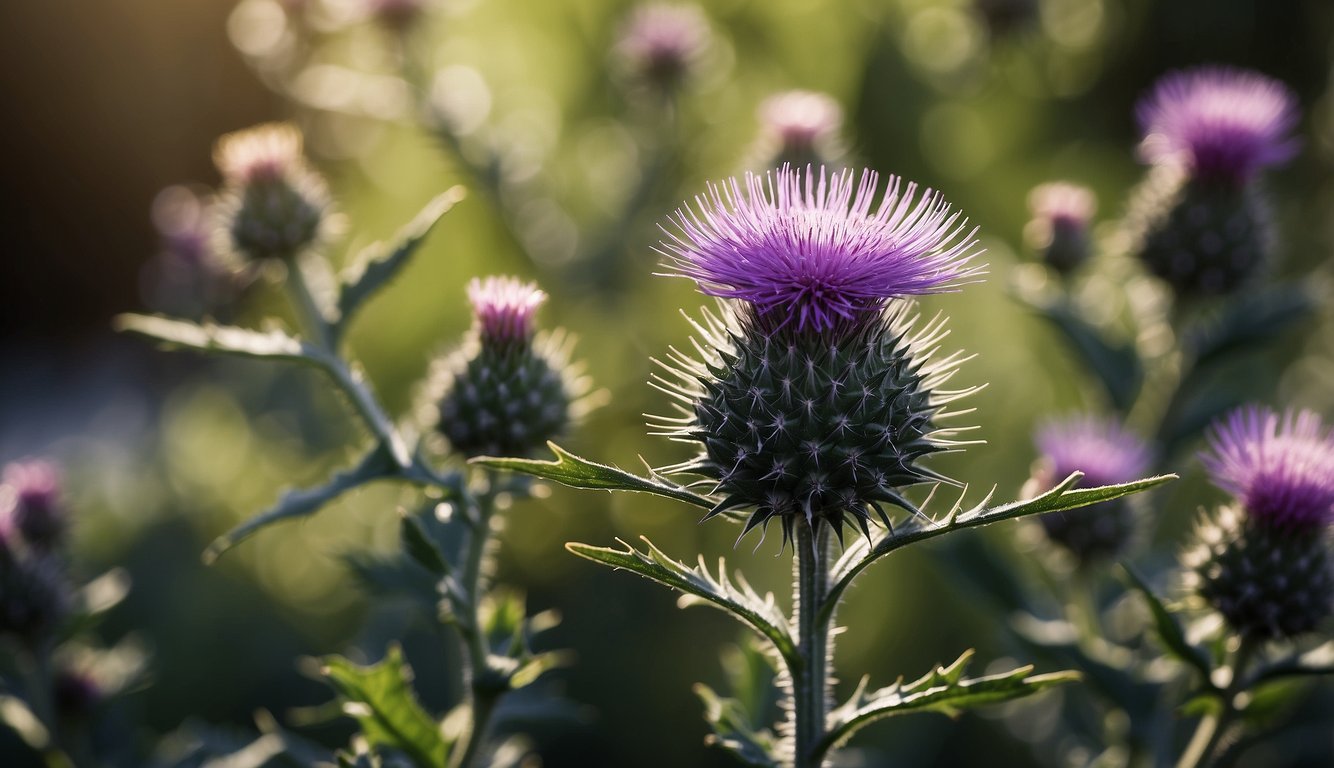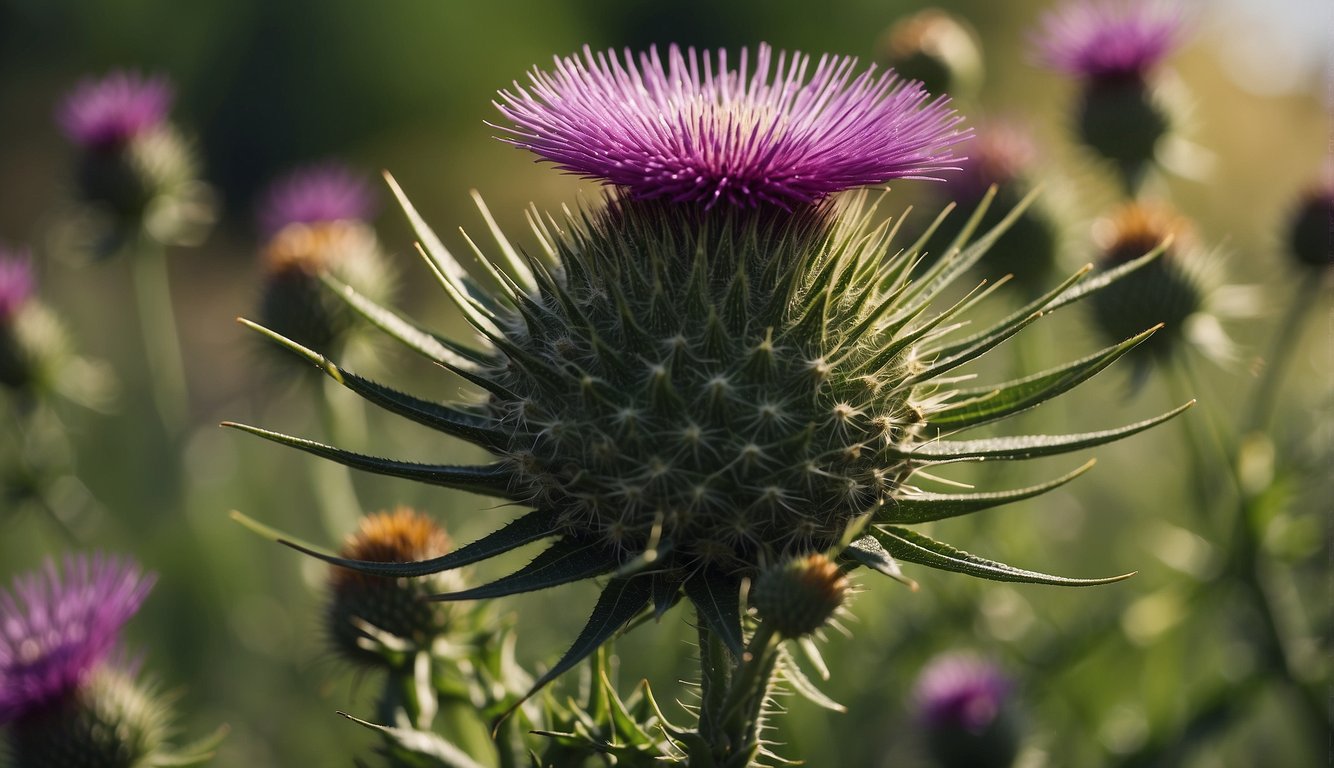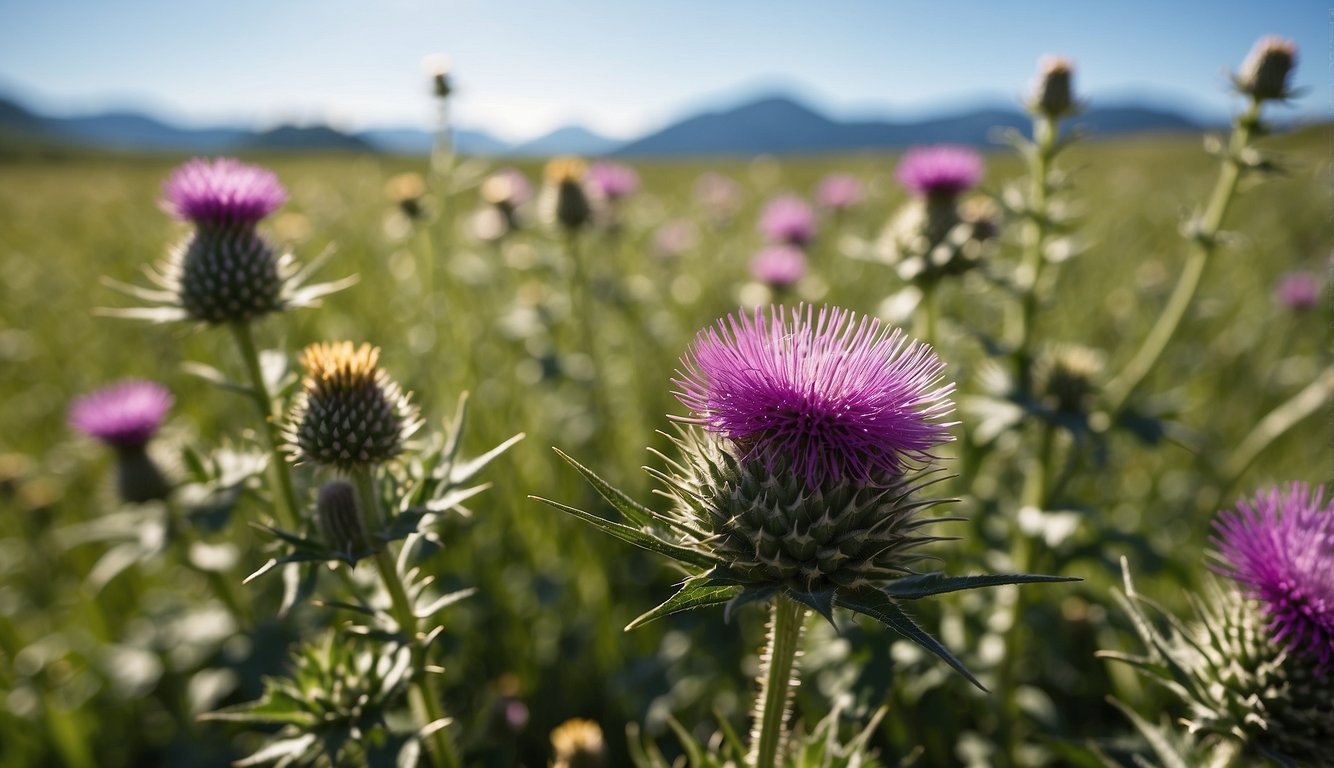Milk thistle, also known as Silybum marianum, is a flowering herb native to the Mediterranean region. So, what are the benefits of milk thistle? Used for centuries as a natural remedy, it is especially effective in treating liver-related conditions. The active compound, silymarin, has antioxidant and anti-inflammatory properties that may promote liver health. Research suggests that milk thistle can help protect the liver from toxins and support its overall function.
In addition to liver health, milk thistle is also thought to have potential benefits for other health conditions. Some research suggests that it may help lower cholesterol levels, reduce insulin resistance in people with type 2 diabetes, and even have anti-cancer effects. However, it’s important to note that while there is evidence supporting these potential benefits, further research is needed to fully understand the extent of milk thistle’s effects on these conditions.
What Is Milk Thistle?
Milk thistle (Silybum marianum) is a flowering plant that belongs to the Asteraceae family. It is native to the Mediterranean region and has been used for centuries for its medicinal properties.
Origin and Botanical Aspects
Milk thistle is a tall plant that can grow up to 10 feet in height. It has large, prickly leaves with white veins and purple flowers. The plant produces small, hard seeds that are used to make extracts and supplements. Milk thistle is commonly found in dry, rocky soils and is often considered a weed.
Active Components and Extracts
The seeds of milk thistle contain a group of compounds known as silymarin. Silymarin is a mixture of flavonolignans, including silybin, silydianin, and silychristin. These compounds are believed to have antioxidant and anti-inflammatory properties, which may help protect the liver from damage caused by toxins and other harmful substances.
Milk thistle extracts are available in various forms, including capsules, tablets, and liquid extracts. The extracts are made from the seeds of the plant and are standardized to contain a specific amount of silymarin.
Milk thistle is a plant that has been used for centuries for its medicinal properties. It contains a group of compounds known as silymarin, which have antioxidant and anti-inflammatory properties. Milk thistle extracts are available in various forms and are commonly used to support liver health.
Primary Benefits of Milk Thistle
As someone who has researched natural health remedies extensively, I can confidently say that milk thistle is a powerful herb that offers many benefits. In this section, I will discuss some of the primary benefits of milk thistle and how it can help improve liver function and overall health.
Liver Protection and Hepatic Diseases
One of the most well-known benefits of milk thistle is its ability to protect the liver from damage and improve liver function. Milk thistle has been used for centuries to treat liver conditions such as hepatitis, cirrhosis, and fatty liver disease. It is also commonly used to help prevent liver damage caused by alcohol and other toxins.
Studies have shown that milk thistle can help reduce liver inflammation and improve liver function in people with liver disease. It does this by helping to regenerate liver cells and protect them from damage caused by free radicals.
Antioxidant Effects and Reducing Oxidative Stress
Milk thistle is also a powerful antioxidant that can help reduce oxidative stress in the body. Oxidative stress is a condition where there is an imbalance between free radicals and antioxidants in the body, which can lead to cell damage and inflammation.
Milk thistle contains a compound called silymarin, which is a potent antioxidant that can help neutralize free radicals and protect cells from damage. This makes milk thistle a great herb for reducing oxidative stress and promoting overall health.
Anti-Inflammatory Properties
In addition to its antioxidant effects, milk thistle also has anti-inflammatory properties that can help reduce inflammation throughout the body. Chronic inflammation is a common underlying factor in many chronic diseases, including cancer, heart disease, and diabetes.
Studies have shown that milk thistle can help reduce inflammation in the body by suppressing the production of pro-inflammatory cytokines. This makes milk thistle a valuable herb for reducing inflammation and promoting overall health.
Potential Anti-Cancer Effects
Finally, milk thistle has also been shown to have potential anti-cancer effects. Studies have shown that milk thistle can help inhibit tumor growth in certain types of cancer, including liver cancer.
While more research is needed to fully understand the anti-cancer effects of milk thistle, the available evidence suggests that it may be a valuable herb for preventing and treating cancer.
Milk thistle is a powerful herb with many benefits for liver health, reducing oxidative stress, reducing inflammation, and potentially preventing cancer. As someone passionate about natural health, I highly recommend incorporating milk thistle into your diet and supplement regimen.
Milk Thistle and Metabolic Health

As a natural supplement, milk thistle has been shown to have various benefits on metabolic health. In this section, I will discuss the impact of milk thistle on diabetes and blood sugar control, as well as its effects on cholesterol and cardiovascular health.
Impact on Diabetes and Blood Sugar Control
Studies have shown that milk thistle may have a positive impact on diabetes management. According to a study published in the Journal of Medicinal Food, milk thistle was found to improve insulin sensitivity and decrease blood sugar levels in people with type 2 diabetes. Another study found that milk thistle supplementation improved insulin resistance in people with metabolic syndrome.
Effects on Cholesterol and Cardiovascular Health
High cholesterol levels are a major risk factor for heart disease. Fortunately, milk thistle has been shown to have a positive effect on cholesterol levels. A study published in the International Journal of Molecular Sciences found that milk thistle extract reduced total cholesterol, LDL cholesterol, and triglycerides in people with high cholesterol.
Moreover, milk thistle has been shown to have antioxidant and anti-inflammatory properties, which may also benefit cardiovascular health. In a study published in the Journal of Ethnopharmacology, milk thistle was found to reduce oxidative stress and inflammation in people with metabolic syndrome.
Milk thistle may have a positive impact on metabolic health, particularly in terms of diabetes management and cholesterol levels. However, more research is needed to fully understand the effects of milk thistle on these conditions.
Additional Health Benefits
Milk thistle has been used for centuries as a natural remedy for various ailments. In addition to its liver-protecting properties, milk thistle has several other health benefits that are worth exploring.
Supporting Bone Health
Milk thistle contains compounds that may help support bone health and prevent bone loss, making it a potentially useful supplement for those at risk of osteoporosis or other bone-related conditions. Silymarin, the active ingredient in milk thistle, has been shown to stimulate bone mineralization and reduce bone resorption in animal studies 1.
Influence on Skin Conditions
Milk thistle has been shown to have a positive effect on several skin conditions, including acne. The anti-inflammatory and antioxidant properties of milk thistle may help reduce inflammation and redness associated with acne, while also protecting the skin from oxidative stress 2.
Digestive System and Gallbladder Support
Milk thistle has traditionally been used to support digestive health and alleviate symptoms of digestive disorders such as diarrhea, gas, and bloating. It may also help treat gallbladder problems, as it can help stimulate bile production and improve gallbladder function 3.
Overall, milk thistle is a versatile herb with a range of potential health benefits beyond its well-known liver-protecting properties. As with any supplement, it is important to speak with a healthcare provider before incorporating milk thistle into your routine.
Milk Thistle in Special Populations

Milk thistle is a natural herb that has been used for centuries to treat various ailments. While it is generally considered safe for most people, there are some special populations that should exercise caution when using milk thistle.
Breastfeeding and Lactation
Breastfeeding mothers should be cautious when using milk thistle. While there is limited research on the effects of milk thistle on breast milk production, some animal studies have suggested that milk thistle may have a negative impact on lactation. Therefore, it is recommended that breastfeeding mothers avoid using milk thistle unless otherwise directed by their healthcare provider.
Considerations for the Elderly
Milk thistle may have potential benefits for the elderly, particularly in the areas of Alzheimer’s disease, Parkinson’s disease, and brain function. However, elderly individuals should exercise caution when using milk thistle due to the potential for interactions with other medications. Milk thistle may interact with certain medications commonly prescribed for the elderly, such as blood thinners, cholesterol-lowering drugs, and diabetes medications.
It is recommended that elderly individuals consult with their healthcare provider before using milk thistle or any other herbal supplement. Additionally, elderly individuals should start with a low dose of milk thistle and gradually increase the dose as tolerated.
Overall, milk thistle may have potential benefits for special populations such as the elderly. However, caution should be exercised when using milk thistle, especially in the case of breastfeeding mothers and elderly individuals taking medications. It is always best to consult with a healthcare provider before using any herbal supplement.
Safety and Side Effects
Milk thistle is generally considered safe when taken in appropriate doses. However, it can cause some adverse reactions in certain individuals. In this section, I will discuss some of the common side effects, possible interactions with medications, and allergy information related to milk thistle.
Common Adverse Reactions
According to the Mayo Clinic, milk thistle can cause gastrointestinal issues such as diarrhea, constipation, nausea, vomiting, and abdominal bloating. These symptoms are usually mild and go away on their own after a few days. If you experience severe or persistent symptoms, you should consult your healthcare provider.
Interactions With Medications
Milk thistle can interact with certain medications, including some cholesterol-lowering drugs, anti-anxiety medications, and immunosuppressants. According to WebMD, milk thistle may increase the effects of these medications, leading to potentially harmful side effects. If you are taking any medications, it is important to talk to your doctor before taking milk thistle.
Allergy Information
Milk thistle belongs to the same family as ragweed, daisies, chrysanthemums, and marigolds. If you are allergic to any of these plants, you may also be allergic to milk thistle. Symptoms of an allergic reaction may include itching, rash, hives, swelling, and difficulty breathing. If you experience any of these symptoms after taking milk thistle, you should seek medical attention immediately.
Milk thistle is generally safe when taken in appropriate doses. However, it can cause some adverse reactions in certain individuals. If you experience any severe or persistent symptoms, you should consult your healthcare provider. Additionally, milk thistle can interact with certain medications, and if you are allergic to ragweed, daisies, chrysanthemums, or marigolds, you may also be allergic to milk thistle.
Usage and Recommendations

Milk thistle is a popular herbal supplement that has been used for centuries to support liver health. As a registered dietitian, I often recommend milk thistle to my clients who are looking for natural ways to improve their liver function. In this section, I will discuss the optimal dosage and forms of milk thistle, as well as how to select a quality supplement.
Optimal Dosage and Forms
The optimal dosage of milk thistle depends on the form in which it is taken. Milk thistle is available in various forms, including tea, pills, tablets, and powder. The recommended dosage for milk thistle tea is 1-2 teaspoons of dried milk thistle leaves per cup of boiling water. Steep the tea for 10-15 minutes and drink it up to three times a day.
For milk thistle supplements, the recommended dosage varies depending on the concentration of the active ingredient, silymarin. The recommended daily intake of milk thistle is 150 milligrams, taken one to three times daily for liver detoxification. For ongoing use and liver support, take 50 to 150 milligrams daily. Always follow the dosage instructions on the label of the supplement and consult with your healthcare provider before taking any new supplement.
Selecting a Quality Supplement
When selecting a milk thistle supplement, it is important to choose a high-quality product from a reputable manufacturer. Look for supplements that contain standardized extracts of milk thistle, with at least 70% silymarin. This ensures that you are getting a consistent dose of the active ingredient.
It is also important to choose a supplement that is free from contaminants and is manufactured in a facility that follows good manufacturing practices (GMP). Look for supplements that have been independently tested by third-party organizations, such as the United States Pharmacopeia (USP) or ConsumerLab.com, to ensure their quality and purity.
Milk thistle is a safe and effective herbal supplement that can support liver health. When selecting a milk thistle supplement, choose a high-quality product from a reputable manufacturer that contains standardized extracts of milk thistle with at least 70% silymarin. Always follow the dosage instructions on the label of the supplement and consult with your healthcare provider before taking any new supplement.
Milk Thistle accelerates protein synthesis by the liver cells
It stimulates the liver to produce SOD, a potent free radical scavenger. Milk Thistle has been found to maintain the basic function of the liver, thereby keeping the blood vascular system clean which has an overall effect of maintaining the health and well-being of the entire body.
Many milk thistle products are available in the health food stores in the U.S. today. Even some drug stores have milk thistle extract on display for over-the-counter sales. These products cannot be labeled with the benefits that have been proven in European laboratories and clinics, but Americans are gradually becoming aware of these benefits.
Mushroom Poisoning:
Milk Thistle has been used as a preventative and or antidote to poisoning by Death Cap mushrooms (amanita phalloidess). Animal studies have found that Milk Thistle completely counteracts the toxic effects of the mushroom if given within 10 minutes of ingestion. If given 24 hours after ingestion, the herb significantly reduces the risk of liver damage and death.
Milk Thistle and Traditional Medicine

Historical and Cultural Significance
Milk thistle has a long history of use in traditional medicine. Its use as an herbal remedy can be traced back to ancient Greece and Rome, where it was used to treat liver and gallbladder problems. In traditional Chinese medicine, milk thistle is known as “holy thistle” and is used to treat a variety of conditions, including menstrual disorders and liver problems.
In Europe, milk thistle has been used for centuries as a remedy for liver and gallbladder problems. The plant was also used to treat snake bites and as a diuretic. In the Middle Ages, milk thistle was considered to be a sacred plant and was associated with the Virgin Mary. It was known as “Mary thistle” or “holy thistle” and was believed to have powerful healing properties.
Today, milk thistle is still used in traditional medicine to treat liver and gallbladder problems. It is also used to treat a variety of other conditions, including high cholesterol, diabetes, and cancer. While there is some scientific evidence to support the use of milk thistle for these conditions, more research is needed to fully understand its effectiveness.
Milk thistle has a long history of use in traditional medicine, dating back to ancient Greece and Rome. Its use as an herbal remedy for liver and gallbladder problems has been well-documented throughout history. While more research is needed to fully understand its effectiveness for other conditions, milk thistle remains a popular and widely used herbal remedy today.
Emerging Research and Future Directions
Novel Therapeutic Applications
As research on milk thistle continues, new potential therapeutic applications are being explored. One area of interest is the use of milk thistle in the treatment of neurological disorders. Silymarin, the active constituent in milk thistle, has been shown to have neuroprotective effects in animal models of Alzheimer’s disease and Parkinson’s disease. These effects may be due to silymarin’s ability to reduce inflammation and oxidative stress in the brain [1].
Another area of interest is the use of milk thistle in the treatment of metabolic disorders, such as type 2 diabetes. Silymarin has been shown to improve insulin sensitivity and reduce blood glucose levels in animal models of diabetes. In humans, a small study found that silymarin supplementation improved insulin sensitivity in patients with type 2 diabetes [2].
In addition to these novel therapeutic applications, there is ongoing research into the use of milk thistle in cancer prevention and treatment. Silymarin has been shown to have anti-cancer effects in animal models of various types of cancer, including breast, prostate, and liver cancer. However, clinical trials in humans have yielded mixed results, and more research is needed to determine the efficacy of milk thistle in cancer prevention and treatment [3].
Overall, the emerging research on milk thistle suggests that it may have a wide range of potential therapeutic applications. While more research is needed to fully understand the mechanisms of action and efficacy of milk thistle, the available evidence suggests that it may be a promising natural remedy for a variety of health conditions.
[1] https://www.ncbi.nlm.nih.gov/pmc/articles/PMC7255183/ [2] https://pubmed.ncbi.nlm.nih.gov/19839067/ [3] https://www.ncbi.nlm.nih.gov/pmc/articles/PMC9588316/
Linking Milk Thistle to TheHerbProf.com

Milk Thistle is a powerful herb with a multitude of health benefits, and at TheHerbProf.com, we’re all about exploring these benefits! Here’s how our website and this subject harmonize:
- Milk Thistle Mysteries: We provide comprehensive information about milk thistle, its medicinal properties, and its uses in herbal medicine.
- Herbal Highlights: Our site offers insights into how milk thistle can be incorporated into your herbal regimen.
- Safety Measures: We guide you on how to use milk thistle safely and effectively.
- Health and Wellness: Our focus is on promoting overall health and wellness, and milk thistle plays a crucial role in this.
- Community Connection: Connect with others who are passionate about milk thistle and share your experiences.
So, whether you’re a milk thistle enthusiast or just starting your herbal journey, TheHerbProf.com is your trusted guide. Remember, stay curious and stay healthy!
References:
Little Herb Encyclopedia, by Jack Ritchason; N.D., Woodland Publishing Incorporated, 1995
The Ultimate Healing System, Course Manual, Copyright 1985, Don Lepore
Planetary Herbology, Michael Tierra, C.A., N.D., Lotus Press, 1988
Handbook of Medicinal Herbs, by James A. Duke, Pub. CRP Second Edition 2007
The Complete Medicinal Herbal, by Penelope Ody, Published by Dorling Kindersley
Before You Go – Check the Following Articles!
Biblical Myrrh: The Ancient Resin with Modern Benefits
Neem Tree Benefits: Amazing Health From This Secret!
Nettle Tea Benefits: Insane Health From This Herb!
Frequently Asked Questions – Milk Thistle Benefits
1. How does milk thistle support liver health?
Milk thistle has been used for centuries as a natural remedy for liver problems. The active ingredient in milk thistle, silymarin, has antioxidant and anti-inflammatory properties that help protect the liver from damage caused by toxins, such as alcohol and certain medications. Silymarin also stimulates the regeneration of liver cells, which can help improve liver function.
2. Can milk thistle aid in skin improvement?
Milk thistle’s antioxidant and anti-inflammatory properties may help improve skin health. Some studies have shown that milk thistle extract may help reduce inflammation and oxidative stress, which can contribute to skin ageing and damage. However, more research is needed to determine the specific effects of milk thistle on skin health.
3. What are the potential risks associated with consuming milk thistle?
While milk thistle is generally considered safe for most people, it can cause side effects in some individuals. Common side effects include gastrointestinal issues, such as diarrhea, constipation, nausea, vomiting, and abdominal bloating. In rare cases, milk thistle may cause an allergic reaction. Individuals with a history of hormone-sensitive conditions, such as breast, uterine, or ovarian cancer, should also avoid milk thistle, as it may have estrogenic effects.
4. Is milk thistle recommended during pregnancy?
Pregnant or breastfeeding women should avoid taking milk thistle, as there is not enough evidence to determine its safety in these populations.
5. How might milk thistle impact kidney function?
Milk thistle has not been shown to have any negative effects on kidney function in healthy individuals. However, individuals with pre-existing kidney conditions should speak with their healthcare provider before taking milk thistle.
6. Are there specific benefits of milk thistle for men’s health?
While milk thistle is often marketed as a supplement for men’s health, there is not enough evidence to support its use for specific conditions, such as prostate health or testosterone levels. However, the antioxidant and anti-inflammatory properties of milk thistle may benefit overall health in men and women alike.
